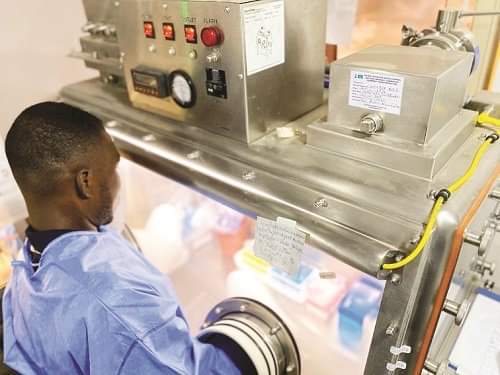
The World Health Organisation (WHO) continues to emphasise the critically important role testing plays in curbing the rampaging spread of the pandemic coronavirus (COVID-19). It describes testing as a game-changer. MOSES EMORINKEN writes on Nigeria’s plan to up its testing capacity
The current mode of testing for COVID-19 in Nigeria is through reference laboratories and central laboratory testing. It entails the collection of a specimen from a patient, which is then transmitted to the reference laboratories for testing.
The process of transiting the specimens or samples to the laboratories takes time, and then, the laboratories take additional time to build up and run the batches. All these add up to days of turnaround time.
Apart from a lot of people not being able to access testing, those who access testing are generally frustrated with the turnaround time because they have to wait for days before they know their status – whether positive or negative.
So, it is generally slow, and for real-time patient management, especially when quick decisions need to be made, what is needed is a test that can rapidly determine status of infection on site. What we need now is a way to identify quickly anyone with the COVID-19 virus.
In the fight to contain the COVID-19 disease, eight laboratories have become the frontline tests centres in-country, using the PCR (polymerase chain reaction) machines.
The laboratories are – NCDC National Reference Laboratory in Abuja, Nigeria Institute of Medical Research in Lagos, Lagos State University Teaching Hospital, and Irrua Specialist Teaching Hospital in Edo state.
Others are – African Centre of Excellence for Genomics of Infectious Diseases (ACEGID) in Osun State, University College Hospital, Ibadan, Virology Laboratory of Alex Ekwueme Federal Teaching Hospital Abakaliki, and the Bio-Security Centre in Lagos State.
The Federal Government’s efforts in increasing the number of diagnostic laboratories, although commendable, still prove to be grossly inadequate to cater for the deluge of test requests from citizens.
However, it seems the country’s testing processes and capacity is about to get a major boost with the announcement by Minister of Health Dr. Osagie Ehanire to covert the existing 398 GeneXpert machines used for the diagnosis of Tuberculosis (TB) and HIV for COVID-19 testing.
With the scaling up of contact tracing and testing capacity by the Nigeria Centre for Disease Control (NCDC), Dr. Ehanire hinted that the country would likely to see a dramatic increase in the number of confirmed cases.
This in itself is not bad because early identification of the disease gives ample room for qualitative treatment and increases the chances for survival. It will also be an indication that the government is beginning to detect more cases because of improved capacities to test.
GeneXpert machine
The GeneXpert machine is a ‘reference lab quality’ test that can be run at the point of care to rapidly detect SARS-CoV-2, the virus that causes COVID-19. Unlike when it is used to diagnose TB and HIV, for COVID-19 test, it uses a different kind of cartridge.
Samples can be taken from patients, put it into the cartridges, and get results ready in 45 minutes. The good thing is that the country already has these machines. It lacks the cartridges to carry out the tests. The government has placed orders for the importation of 5,000 cartridges to be delivered in about two weeks.
What is unique about the GeneXpert is its ability to carry out all the steps of a reference lab analysis, which means extracting viral RNA from the sample, amplifying it with molecular amplification methods, and detecting it. It does all these processes in a seamless integrated way and delivers results quickly.
According to the Executive Director of KNCV Nigeria, Dr. Bethrand Odume, “The GeneXpert, manufactured by Cepheid in the United States, uses different cartridges to test a variety of diseases. They are developing it such that some cartridges can detect breast cancer in females.
“Now they have discovered another cartridge they call Xpress SARS-CoV-2 that can be used to test for coronavirus. They have gotten an emergency approval in the US because the current testing modality for COVID-19 is PCR, and the PCR runs in batches for 6 hours, and the numbers may not meet the demand because a lot of people want to be tested.
“Presently in Nigeria, the testing capacity is low and access to testing is difficult. But the ground breaker in the whole arrangement is the discovery by the Cepheid team, – that you can use that cartridge on any GeneXpert platform and you will be able to get a result in 45 minutes. The cost for a cartridge is $19.8 (N7,128).
“In a day, 96 tests can be performed with a single four modular GeneXpert. You give 15 minutes of sample preparation. For 8 hours working hour in a day, you can run 36 test. If we target 5 GeneXpert machines per State, it will be the best. A single machine costs $17,000.
“However, the good thing is that there are 398 of the machines already in the country. Also, 10 DR tuberculosis labs in the country have this capacity and all have GeneXpert machines that can be targeted first.
“The cost for other support including power back up, needed Personal Protective Equipment (PPE) and Biosafety cabinet will cost about N18m the five (5) sites for the GeneXperts in states.”
The National Professional Officer-in-Charge of Tuberculosis at the WHO, Dr. Ayodele Awe, said: “For us, this will be a good collaboration between a disease entity that is pandemic and the other (Tuberculosis), that already has a diagnostic tool.
“There are 398 machines in the country that are procured by partners – WHO, USAID, Global Funds, and are spread all over 774 local governments. They are the source for diagnosing tuberculosis.
“Currently there are a lot of challenges with testing for COVID-19, also, it seems like the only people that are accessing that diagnostic in terms of COVID-19, are the highly-placed people – Governors, Ministers, and their contacts. Also, maybe those that have returned into the country from high-risk countries.
“Most people have tried the numbers given by the NCDC, but the response they usually get is – ‘do you have a symptom? If you do not have a symptom, please do not call this number again’. So, it means that every other person, except that you are a highly-placed, cannot access the eight testing sites that exist currently.
“Therefore, for effective monitoring of COVID-19, there is need to decentralize and expand testing services. That is when we will know the impact of the COVID-19 at the community and state level.
“So, this is good news for Nigerians because if the GeneXperts are integrated into the testing chain, people can invariably have access to the 398 diagnostic centres with the machines for testing.
“This will rapidly increase our diagnosis and ensure that every person that has the disease is detected before the spread. For us, we are eagerly ready to collaborate with the COVID-19 team to use these machines.”
The Registrar/Secretary General, West African Postgraduate College of Medical Laboratory Science (WAPCMLS), Abuja, Dr. Godswill Okara, said: “It is a step in the right direction and that is the way to go.
We have said now and again, that’s while we commend the Federal Ministry of Health, the NCDC, and the Presidential Task Force, for the good job they are doing in updating the public and giving out appropriate information and guidelines, the right thing to do is to take further steps to increase the testing methodologies and testing centres.
“The centrality of laboratory testing in the containment efforts of the outbreak is very obvious because the World Health Organization (WHO) made it clear, when its Director-General said ‘our simple message to all countries is test, test, test’.
“More so, the continuous information has tended to produce fear and panic among the populace. So, the only way to also allay that fear is to ensure that access to testing is decentralised and people can get tested to have their minds at rest.
“Increasing the testing will ensure that those that need attention, and those that are infected can be identified, isolated and treated. That way, the outbreak can be contained. There is evidence in South Korea increasing testing platforms, also in Singapore, South Africa and a few other countries.”
Concerning measures and structures that need to be in place for safety, functionality and overall optimisation of the GeneXpert machines, Dr. Odume, said: “There needs to be some precautions because the coronavirus is a very hazardous agent and health care workers need to be trained and the adequate precautionary measures need to be put in those GeneXpert sites.
“Out of the 407 GeneXpert sites in the country, about 398 are said to be functional. Also, only about 10 are actually in a functional reference lab that has the maximum precautionary measures they call it bio safety level 2 minimum.
“In these reference labs, samples can be prepared, and the laboratorian will not be afraid of contracting any coronavirus infection because proper personal protective measures are put in place. We can start with the 10 first.
“On the issue of human resources, health workers need to be trained on the precautionary measures. They also need to be supported with adequate electricity or alternative power sources 24 hours because some of these GeneXpert machines are not being optimized because of power.
“When you run the GeneXpert machine, it is expected to work within a given ambience temperature, and when there is no AC, they keep on breaking down. If these requirements are in place, I think the facilities will be in the best position to support the epidemic response.
“Our office is already working with the Nigeria Centre for Disease Control (NCDC), and we have placed orders for 5,000 cartridges.
“Once we have it, even if it’s not all the 398 GeneXpert machines, it can help to reduce the burden on the PCR labs, and also improve access to testing for many people that need to be tested.”
Nigeria’s current testing capacity
A report on a survey to assess the preparedness/containment efforts/activities for Covid-19, done by the Nigerian Medical Association (NMA), reveals that there is still a huge gap of 90.2 per cent as far as testing for COVID-19 across the country is concerned.
Also, the report further showed that as far as evidence of reliable telephone contact to the testing facilities is concerned, the country still has a gap of 70.8 per cent.
However, the government said the daily laboratory testing capacity nationally has been increased to 1,500 tests per day. Also, till date, the country has been able to carry out about 4,000 tests since the outbreak of the virus in the country.
As at the time of this report, statistic from the NCDC shows that 70 per cent of confirmed cases for COVID-19 are males, while the remaining 30 percent are females. Also, with regards to contact tracing, a cumulative total of 6,701 passengers of interest (POI) identified are being monitored.
From expert calculations, one GeneXpert machine can perform 96 tests in a day if it runs for 24 hours and staff run shifts.
The implication of this is that, with 398 GeneXpert machines in the country, in a single daily the country can potentially perform 38,208 tests.












